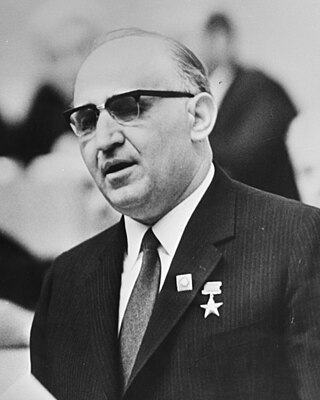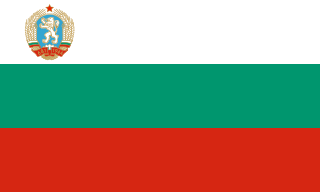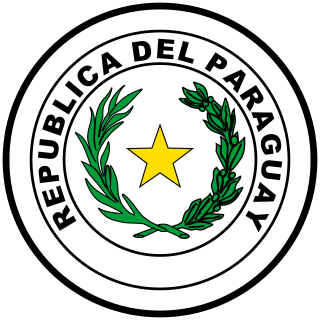
Todor Hristov Zhivkov was a Bulgarian communist statesman who served as the de facto leader of the People's Republic of Bulgaria (PRB) from 1954 until 1989 as General Secretary of the Bulgarian Communist Party. He was the second longest-serving leader in the Eastern Bloc, the longest-serving leader within the Warsaw Pact and the longest-serving non-royal ruler in Bulgarian history.
The 1977 Constitution of the Soviet Union, officially the Constitution of the Union of Soviet Socialist Republics, was the constitution of the Soviet Union adopted on 7 October 1977.

Valko Velyov Chervenkov was a Bulgarian communist politician. He served as leader of the Communist Party between 1949 and 1954, and Prime Minister between 1950 and 1956.

Protestantism is the third largest religious grouping in Bulgaria after Eastern Orthodoxy and Islam. In the census of 2011, a total of 64,476 people declared themselves to be Protestants of different denominations, up from 42,308 in the previous census in 2001 and from 21,878 in 1992. The marked rise in the number of Protestants in the last two decades is partly due to a boom in conversions among the Bulgarian Roma. In 2001, the two largest ethnic group among the Bulgarian Protestants were the Bulgarians and the Romani with some 25,000 members each.

The People's Republic of Bulgaria, from 1990 onwards known as Republic of Bulgaria, was the official name of Bulgaria when it was a socialist republic from 1946 to 1990, ruled by the Bulgarian Communist Party (BCP) together with its coalition partner, the Bulgarian Agrarian People's Union. Bulgaria was closely allied and one of the most loyal satellite states of the Soviet Union during the Cold War, sometimes being called the 16th Soviet Republic rather than an independent country. Bulgaria was also part of Comecon as well as a member of the Warsaw Pact. The Bulgarian resistance movement during World War II deposed the Kingdom of Bulgaria administration in the Bulgarian coup d'état of 1944 which ended the country's alliance with the Axis powers and led to the People's Republic in 1946.

The Great National Assembly was the legislature of the Socialist Republic of Romania. After the overthrow of Communism in Romania in December 1989, the Great National Assembly was dissolved by decree of the National Salvation Front (FSN) and eventually replaced by the bicameral parliament, made up of the Chamber of Deputies and the Senate.

The Constitution of the Republic of Bulgaria is the supreme and basic law of the Republic of Bulgaria. The current constitution was adopted on 12 July 1991 by the 7th Grand National Assembly of Bulgaria, and defines the country as a unitary parliamentary republic. It has been amended five times.

The Constitution of Armenia was adopted by a nationwide Armenian referendum on July 5, 1995. This constitution established Armenia as a democratic, sovereign, social, and constitutional state. Yerevan is defined as the state's capital. Power is vested in its citizens, who exercise it directly through the election of government representatives. Decisions related to changes in constitutional status or to an alteration of borders are subject to a vote of the citizens of Armenia exercised in a referendum. There are 117 articles in the 1995 constitution. On November 27, 2005, a nationwide constitutional referendum was held and an amended constitution was adopted. The constitution was amended again in a national referendum on December 6, 2015 that changed the political structure from a semi-presidential system to a parliamentary republic.

The Constitution of Laos specifies the functions and powers of the government of the Lao People's Democratic Republic, and defines the rights and duties of Laotian citizens. The constitution was adopted on August 14, 1991, sixteen years after the 1975 establishment of the Republic, a period during which the country functioned without a written constitution or published penal and criminal codes. It consists of a Preamble and Articles, and legally establishes a set of authorities that resemble the traditional differentiation among executive, legislative, and judicial branches of government.

The Socialist Alliance of Working People of Yugoslavia or SSRNJ, known before 1953 as the People's Front, was the largest and most influential mass organization in SFR Yugoslavia from August 1945 through 1990. By 1990, its membership was thirteen million individuals, including most of the adult population of the country. Together with the League of Communists of Serbia, it merged in July 1990 to form the Socialist Party of Serbia.

The Constitution of Guyana is the highest governing document in the Republic of Guyana. It came into effect on October 6, 1980, replacing the constitution enacted in 1966 upon its independence from the United Kingdom. The current Constitution of Guyana contains 12 chapters that are further divided into 232 articles. It also contains a preamble and an oath. Since its 1980 enactment, it has gone through multiple amendments.

The Zhivkov Constitution was the third Constitution of Bulgaria, and the second of the Communist era. It was in effect from May 18, 1971 to July 12, 1991.

The Constitution of Ivory Coast was approved by referendum on October 30, 2016 and officially adopted on November 8, 2016.

A constitutional referendum was held in Paraguay on 4 August 1940. It saw voters approve the new constitution.

A referendum on becoming a republic was held in Bulgaria on 8 September 1946. Official results showed 96% in favour of the change against only 4% in favour of retaining the monarchy, with voter turnout reported to be 92%. The monarchy had effectively ended soon after the coup of 9 September 1944, which saw the Fatherland Front seize power. At that time, the regency council for the de jure head of state, Tsar Simeon II, was replaced by a new council made up entirely of members of the Bulgarian Communist Party, the dominant force of the Fatherland Front. The Communists had thus been in de facto control of the country for two years before the monarchy was formally voted out of existence.
The 1953 Yugoslav Constitutional Law was a big packet of constitutional amendments to the 1946 Yugoslav Constitution, with the goal of introducing the idea of self-management in the constitutional matter of the Federal People's Republic of Yugoslavia. It came into effect on January 13, 1953. The amended 1946 constitution would remain in power until the adoption of the 1963 Yugoslav Constitution.
Parliamentary elections were held in Romania on 30 November 1952. They were the second held under undisguised communist rule, and the first under a constitution adopted that September. They were also the first held after longtime Prime Minister Petru Groza handed the post to Gheorghe Gheorghiu-Dej, who as leader of the communist Romanian Workers' Party (PMR) had been the country's de facto leader since the communists seized full power in 1947.

The Front of Socialist Unity and Democracy was a political alliance in Romania from 1968 to 1989, dominated by the Romanian Communist Party (PCR).
Events in the year 1947 in Bulgaria.
The State Council was a body of state power in the People's Republic of Bulgaria from 1971 to 1989. It was the collective head of state before the creation of the office of President in 1989. It operated similarly to the Presidium of the Supreme Soviet of the Soviet Union, being an organ of the Bulgarian National Assembly.














